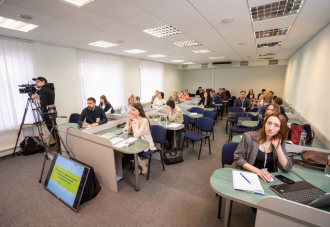How civil society organizations have to submit information on the ultimate beneficial owner: CEDEM held an expert working discussion within a series of public events aimed at discussing the fight against money laundering and the financing of terrorism and its impact on CSO activities.
October 11 this year is the last day when civil society organizations (both NGOs and charitable foundations) will be able to submit information on the ownership structure and ultimate beneficial owners (UBOs). This is a relatively new reporting for CSOs that Ukraine has introduced to meet the standards of the Financial Action Task Force (FATF).
And it is because of novelty that such an obligation can create problems for the public sector. After all, not every organization knows how to submit information correctly, and many CSOs do not have an ultimate beneficial owner at all.
Therefore, as part of the Sectoral Support Activity, on September 28, CEDEM held a discussion on “Submission of Information on UBOs: Mechanism, Practice and Risks”. The speakers not only provided expert assessments of the situation, but also prepared specific advice, recommendations and sample documents to help CSOs report on the ultimate beneficiaries. The event gathered more than 40 participants online and was viewed 750 times.
“This topic is more difficult for civil society than for businesses, because in most cases NGOs do not have ultimate beneficial owners, so they face a great challenge: how to reflect their presence and absence. There are bound to be NGOs, especially in the regions, that do not know about this requirement. It is necessary to talk about ways to submit this information, how organizations that do not have ultimate beneficial owners can indicate this,” emphasized Mariia Heletii, Deputy Project Manager of the Civil Society Sectoral Support Activity implemented by the Initiative Center to Support Social Action “Ednannia”.
Therefore the experts focused on constructive work to develop information materials. “They are intended for distribution and are addressed to those NGOs and charitable foundations that have not yet resolved this issue. And judging from the number of people registered for discussion, we understand that there are a lot of them,” said Anna Isichko, coordinator of the Project Ukraine Civil Society Sectoral Support Activity at CEDEM.
In particular, the speakers of the event told the audience who should be considered the ultimate beneficial owner, answered the questions: who can submit information about them and how and where this can be done. They also showed a list of documents required for reporting.
“We are concerned about the situation, because none of us, NGOs, wants to pay a UAH 51,000 fine for incorrect information about the ultimate beneficiaries. This responsibility is new to CSOs. And the rule of law is not fully explained: what non-profit organizations should do, who the ultimate beneficial owner is, given that the NGO has two governing bodies, a general meeting and a head. Very often there is also a board, and there can be 3-4 or 100 or even 1000 members. The second key issue: how to fill in all the documents correctly, how to draw up a statement and submit it,” said Maksym Latsyba, Head of Goal 2 of the Ukraine Civil Society Sectoral Support Activity Project, Ukrainian Center for Independent Political Research (UCIPR).
To help NGOs and charitable organizations provide information on the ultimate beneficial owners, the Activity participants developed reference materials. Therefore, anyone can use the sample form 4 for organizations without an ultimate beneficial owner or view examples of ownership structures: with and without the ultimate beneficial owner.
The information can be submitted by the head of the organization or an authorized person: in person with the applicant’s passport or by mail (however, the signature must be notarized). Such reports are accepted by the Departments of State Registration of Printed Mass Media and Public Associations, Administrative Services Centers (ASC) and notaries (those of them who provide such a service).
Required documents: application for state registration of a legal entity – form 2 (for charitable organizations) or form 4 (for NGOs); ownership structure; ID card or notarized copy of the passport of a citizen of Ukraine; extract, excerpt or other document from the trade, banking, court register, etc. confirming the registration of a non-resident legal entity in the country of its location, if the founder of the legal entity is a non-resident legal entity. Oleh Lapin, UCIPR expert, told the event participants about this.
In addition, the event was an opportunity for the public sector to find out the position of government agencies, since Viacheslav Hardikov, Acting Director of the Department of Notary and State Registration of the Ministry of Justice of Ukraine and Anatolii Leshchenko, Deputy Director of the Department of Notary and State Registration – Head of the Department of Legal Support of State Registration of the Ministry of Justice of Ukraine, took part in the discussion.
Dmytro Mazurok, project coordinator of the Ukraine Civil Society Sectoral Support Activity Project at the UCIPR, also told the participants about Hotline which CSOs can call if they experience problems with reporting.
According to the expert, UCIPR intends to monitor the case law in cases related to the issue of ultimate beneficial owners.
“There is a request from the public to postpone the submission of information. And there is a very clear request to remove NGOs from the list of those that report on the ultimate beneficial owners, as is done for political parties. That is why we appeal to the public to support our joint statement,” urged Dmytro Mazurok. You can read the text of the public statement with such appeals and sign it (until October 1) at the link.
The event was organized as part of the Project Ukraine Civil Society Sectoral Support Activity implemented by the Initiative Center to Support Social Action “Ednannia” in partnership with the Ukrainian Center for Independent Political Research (UCIPR) and Centre for Democracy and Rule of Law (CEDEM) with the sincere support of the American people through United States Agency for International Development.





